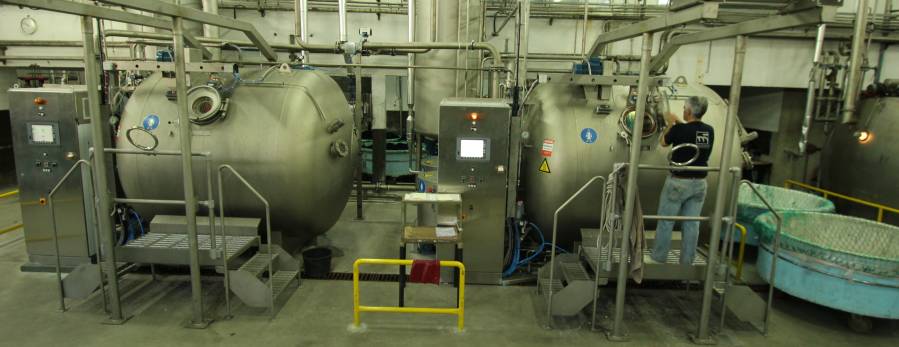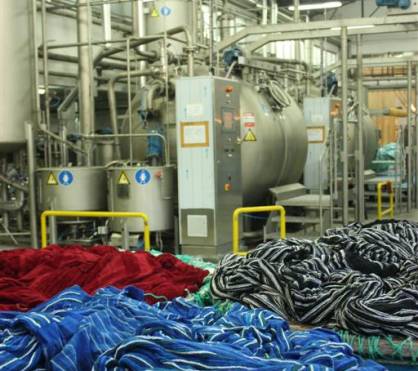Dyeing, Drying, Finishing
New Thies iMaster F dyeing machines meet 24/7 duties in Portugal

The order, placed through local distributor Joao Sampaio, marks the start of an on-going modernisation programme to replace up to eight older Portugese-marque dyeing machines. It also coincides with an increased order book from European buyers seeking an alternative supplier to those in Asia.
“The trend began some 16 months ago when we had spare capacity as a result of the Euro crisis,” explained Mundotextil director, José Casimiro Coelho Lima. “Whilst we could not compete with the large batch production, we can certainly beat them for the smaller runs with on-time deliveries, ease of logistics and transportation, together with repeated high quality.” He continued, “As a direct result, we are seeing a return of many of our old European customers and several new ones – resulting in 24/7 production to meet demand.”
The new Thies units have allowed Mundotextil to meet demand with increased production together with significant savings on energy, water and chemicals.
iMaster F dyeing machines
Only recently introduced, the iMaster F series of dying machines have been designed particularly for heavy pile fabrics, such as terry towelling, ensuring economic and environmental operation with advanced automation at low liquor levels as low as 1:4 for cotton. The system features a large transport winch inside the dyeing kier to be processed with significantly reduced elongation. This results in an improved stability, perfect fabric condition and appearance. Moreover, the iMaster F series is able to process a wide range of different articles.
Equipped with a 100% stock tank, a dosing tank and delivery system for dry salt, the machine is supplied optimised for the production of Terry articles. The automatic self-cleaning filter system always helps to achieve the same dyeing and treatment conditions every time. Manual interventions for cleaning are reduced and productivity is increased. Dyecontrol allows the visual display of the treatment curves to control the liquor clarity as well as the determination of the dye exhaust from the liquor.
The dyer recognizes if and when the dyes migrate from the aqueous phase to the fibre. During rinsing bath saturation can be determined. This allows program steps to be shortened and sequences to be programmed more efficiently; making treatment processes transparent and optimized. Rinse, wash and dye baths are measured on-line, continuously analysed and displayed graphically.
Mundotextil
Mundotextil produce a wide range of terry towelling principally in jacquard with weights of 300 – 1500 g/m² handled by the iMaster F at reduced liquor ratios of 1:5 compared with the older units. Dye House Manager, Carla Azevedo, also acknowledged that the iMaster F offered increased flexibility by easily adapting to mixed weight loads in the 400 kg capacity units. Terry products include towels, bath robes, bath mats, beach towels and sleepers. The company also produces its ‘hotel line’ for worldwide distribution; exporting virtually 98% of production.
The company is considered to be one of the leading producers in Europe with a 38 million Euros turnover in 2012, which is expected to increase to 42 million Euros in 2013. Founded in 1975, following the April 1974 revolution in Portugal, a period of instability combined with an adverse economic situation delayed the start of a planned vertical expansion. The vertical integration of yarn spinning, jacquard weaving and dyeing however had been completed by 1992 to offer increased production capability.
By 2006 the company had initiated an expanded logistics programme to serve the European and American markets, together with the launch of specialised chain stores in Portugal, Germany and Central Europe. Today, the company is undertaking another modernisation programme with energy savings, increased production and environmental issues as key objectives; with the Thies dyeing units playing a pivotal role.
Earth towel
Currently undergoing trials with Mundotextil, Earth towel is a 100% environmental towel, produced with enzymes eliminating the use of chemicals. It also offers further reductions in processing times, water and energy consumption. Enzymes are used in the whole process starting with the preparation until the finishing without any additional chemicals. It is anticipated that the new fabric will save an estimated 20m³ of water per ton of fabric - the equivalent of 100,000m³ of water per year for a medium sized textile mill.

